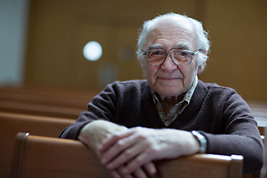
Holocaust survivor Erwin Farkas photographed
Wednesday, Apr. 10, 2013 at Mount Zion Temple in St. Paul. (MPR
Photo/Jennifer Simonson)
Drama of real Holocaust survival brought to Twin Cities stage
by Dan Olson, Minnesota Public Radio
April 24, 2013
ST. PAUL, Minn. — Erwin Farkas was 10 years old when World War II began in 1939, but the reality of the war didn't reach his Jewish family and their orchard in Romania until 1944.
By then, there were government-imposed restrictions on Jews owning businesses, and even their daily activities. Then, the deportations began: The Jews were rounded up, put in railroad box cars and taken away.
Farkas, now 83, remembers leaving the village with other Jews as their neighbors watched, silently, "like they were a little baffled and curious."
Like Jews from all other parts of Nazi-occupied lands, Farkas and his family were being taken to Birkenau, part of the infamous Auschwitz complex, in Poland. Known as Auschwitz II, it opened in 1942 and eventually served as the extermination camp for about 1 million people, about 90 percent of the victims of Auschwitz.
It was there, standing in line, that he noticed a pattern: The old men and young boys walked in one direction, while those older 16 walked in another.
"One way was to the labor camp and the other way probably was the crematorium," the Roseville man recalls.
So Farkas lied about his age. He said he was 16, rather than 15 years old.
The lie saved his life. Farkas and his older brother were assigned to forced labor.
Not that camp life was safe; death was always near at hand. Those who became sick were taken away and never seen again. And it didn't help that prisoners were fed so little. A crust of bread and some thin soup was hardly enough to survive.
"Basically, we were being starved," he says.
Then, near the end of World War II, in early 1945, his captors forced Farkas, his brother and the other slave laborers, now not more than skin and bones, to march deeper into Germany -- a death march, with no food or water except the snow and roots they could find in the forest.
"If you couldn't keep up you were shot."
Farkas has a vivid memory of his liberation. He and other prisoners witnessed the chaos from a barn as German soldiers who had been guarding them began firing at approaching Allied troops - Americans, who drove out the Nazi troops and handed the prisoners chocolate and candy. One American soldier, guarding the new German prisoners of war, noticed that Erwin's brother, Zoltan had no shoes; the soldier ordered one of the prisoners, a German officer, to take off his shoes and give them to Zoltan. Then they fled for their lives, finding clothing and food in houses abandoned by Germans.
Only Farkas and his brother survived the war. All their other family members were killed.
The brothers eventually made their way to New York City, lived with relatives, finished high school and college. For Farkas, that meant eventually completing a PhD in psychology at the University of Minnesota and a job at what was then the state hospital in Rochester.
Farkas' Holocaust survival story is part of a new play by St. Paul resident Sharon DeMark, with Klezmer music performed by Judith Eisner. Actors in the production weave together the stories of eight survivors, all members of Mount Zion Temple in St. Paul, seven of whom are still alive.
The accounts remind audiences that even sophisticated cultures can succumb to evil, DeMark says.
"If that's an advanced, civilized society and they created this unbelievably tragic machine," he says. "That's why we hear these stories, and stories and other persecuted people, so we can understand that it can happen."
And it does still happen.
Farkas remembers his reaction to pictures of emaciated Bosnian Muslims behind wire fences who were rounded up and then murdered by Serb soldiers in the early 1990s.
"And I'm looking at that, and that's exactly how we looked."
Serbia wasn't far from where Farkas grew up.
"And these are people who I had a very positive feeling toward," he says. "They were doing it essentially to their brothers."
Farkas says doesn't believe the Holocaust can be explained by what he calls any normal psychological definition. He doesn't know why his neighbors didn't raise their voices as they watched police lead his family and other Jews away from the village.
"And that kind of makes me think, well, how would I behave, if I was in a situation like that? Would I resist? Would I go along?" An optimist by nature, he chooses to remember those who did help. "There were individuals including Germany, in every country, that did things, where they actually risked their own lives or their own freedom."


No comments:
Post a Comment